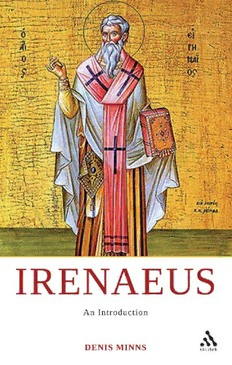
Irenaeus: An Introduction PDF
Preview Irenaeus: An Introduction
Irenaeus This page intentionally left blank Irenaeus An Introduction Denis Minns Published by T&T Clark International A Continuum Imprint The Tower Building, 11 York Road, London SE1 7NX 80 Maiden Lane, Suite 704, New York, NY 10038 www.continuumbooks.com All rights reserved. No part of this publication may be reproduced or transmitted in any form or by any means, electronic or mechanical, including photocopying, recording or any information storage or retrieval system, without permission in writing from the publishers. Copyright© Denis Minns, 2010 Denis Minns has asserted his right under the Copyright, Designs and Patents Act, 1988, to be identifi ed as the Author of this work. British Library Cataloguing- in-Publication Data A catalogue record for this book is available from the British Library. ISBN: 978- 0-567-03365-9 (Hardback) 978- 0-567-03366-6 (Paperback) Typeset by Pindar NZ, Auckland, New Zealand Printed and bound in Great Britain by CPI Antony Rowe Ltd, Chippenham, Wiltshire For Bernice In memory of Jack This page intentionally left blank Contents Abbreviations viii Preface ix 1 Introduction 1 2 Heresies 15 3 The One God 31 4 Knowing the One God as Father, Son and Holy Spirit 47 5 The Divine Plan of Salvation 69 6 From Adam to Christ 97 7 From Christ to the Kingdom 119 8 Conclusion 149 Bibliography 159 General Index 169 Index to Works of Irenaeus 171 Index of Biblical Passages 175 Abbreviations AH Adversus Haereses Dem Demonstration of the Apostolic Preaching SC Sources chrétiennes Preface When Erasmus published the fi rst edition of Adversus Haereses in 1526 he referred to its author as ‘my Irenaeus’. He was proud to claim own- ership not just because he had restored to light a book that had been virtually forgotten for over a thousand years, but much more because it revealed a picture of the life and thought of the early Church that was markedly and refreshingly different from the life and thought of the Church of his own times. It breathed, he said, the ancient vigour of the Gospel. This was in the letter by which he dedicated the edition to the bishop of Trent, the city in which the Council of the Counter- R eformation was to meet some 19 years later. Erasmus hoped that in his own troubled times another Irenaeus might rise up and lead the Church back to peace through the spirit of the Gospel.1 Irenaeus has shown no sign of falling back into oblivion. Many edi- tions and translations of his works have appeared, and much scholarship has been devoted to them. Most authors writing from within the broad catholic tradition have shared Erasmus’ enthusiasm for Irenaeus. Some have even gone beyond Erasmus’ claim of ownership to contend that others, for confessional purposes, have tried to steal him. Thus, the French Catholic Massuet thought the German Anglican Grabe had tried to make an unwilling and reluctant Anglican of Irenaeus.2 While his admirers look to Irenaeus as one of the earliest repre- sentatives of the developing catholic tradition and could point to the documents of the Second Vatican Council as witness to the reinvigorat- ing infl uence of his theology, admiration for him has not been universal. Those who have considered his early catholicism itself to be a perversion 1 D. Erasmus (ed.), Opus eruditissimum Divi Irenaei (Basle, 1526), pp. 2–3. 2 Massuet (ed.), Sancti Irenaei . . . Opera (Paris, 1710), pp. vi–vii. ix
